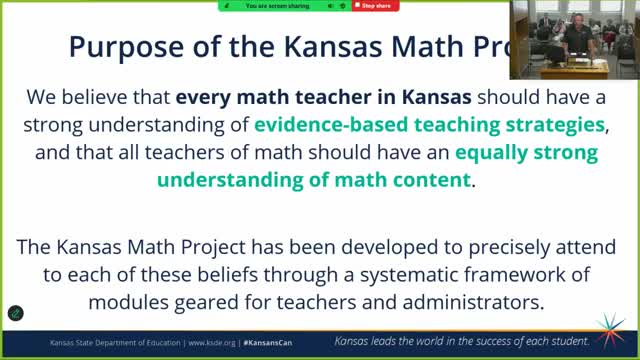Kansas Math Project garners national attention for evidence based instructional strategies
July 09, 2025 | Department of Education, State Agencies, Organizations, Executive, Kansas
This article was created by AI summarizing key points discussed. AI makes mistakes, so for full details and context, please refer to the video of the full meeting. Please report any errors so we can fix them. Report an error »

In a vibrant meeting room filled with educators and policymakers, the Kansas State Board of Education convened on July 9, 2025, to discuss the ambitious Kansas Math Project, a groundbreaking initiative aimed at enhancing math instruction across the state. The atmosphere buzzed with anticipation as board members and specialists shared insights on the project’s alignment with educational standards and its potential to transform teaching practices.
At the heart of the discussions was the emphasis on evidence-based instructional strategies. The Kansas Math Project, which has garnered national attention, is touted as the only program of its kind in the country. It aims to equip teachers with the necessary tools and resources to improve math education, particularly for students who struggle. The project is built on a foundation of rigorous research, utilizing randomized controlled trials and systematic reviews to ensure that the strategies employed are effective and reliable.
Dr. Witzel and Dr. Powell, along with a dedicated team of specialists, were publicly acknowledged for their tireless efforts in bringing the Kansas Math Project to fruition. Their work, supported by hundreds of educators statewide, has positioned the project as a model for evidence-based professional development in math instruction. The Education Advisory Board has even recommended the project to over 2,100 districts and institutions across the nation, highlighting its significance in the educational landscape.
As the meeting progressed, the focus shifted to the practical implications of the project. The Kansas Math Project aims to address the critical need for improved math skills in students, particularly in a state where many careers are STEM-oriented. By providing a comprehensive training system for educators from pre-K through 12th grade, the initiative seeks to prepare students for future opportunities without the limitations of inadequate math skills.
The board members expressed optimism about the project’s potential impact, noting that it not only aligns with the state’s educational standards but also promotes high expectations for quality instruction. As the meeting concluded, the sense of purpose and commitment to improving math education in Kansas resonated throughout the room, leaving attendees eager to see the positive changes that lie ahead for students and teachers alike.
At the heart of the discussions was the emphasis on evidence-based instructional strategies. The Kansas Math Project, which has garnered national attention, is touted as the only program of its kind in the country. It aims to equip teachers with the necessary tools and resources to improve math education, particularly for students who struggle. The project is built on a foundation of rigorous research, utilizing randomized controlled trials and systematic reviews to ensure that the strategies employed are effective and reliable.
Dr. Witzel and Dr. Powell, along with a dedicated team of specialists, were publicly acknowledged for their tireless efforts in bringing the Kansas Math Project to fruition. Their work, supported by hundreds of educators statewide, has positioned the project as a model for evidence-based professional development in math instruction. The Education Advisory Board has even recommended the project to over 2,100 districts and institutions across the nation, highlighting its significance in the educational landscape.
As the meeting progressed, the focus shifted to the practical implications of the project. The Kansas Math Project aims to address the critical need for improved math skills in students, particularly in a state where many careers are STEM-oriented. By providing a comprehensive training system for educators from pre-K through 12th grade, the initiative seeks to prepare students for future opportunities without the limitations of inadequate math skills.
The board members expressed optimism about the project’s potential impact, noting that it not only aligns with the state’s educational standards but also promotes high expectations for quality instruction. As the meeting concluded, the sense of purpose and commitment to improving math education in Kansas resonated throughout the room, leaving attendees eager to see the positive changes that lie ahead for students and teachers alike.
View full meeting
This article is based on a recent meeting—watch the full video and explore the complete transcript for deeper insights into the discussion.
View full meeting
